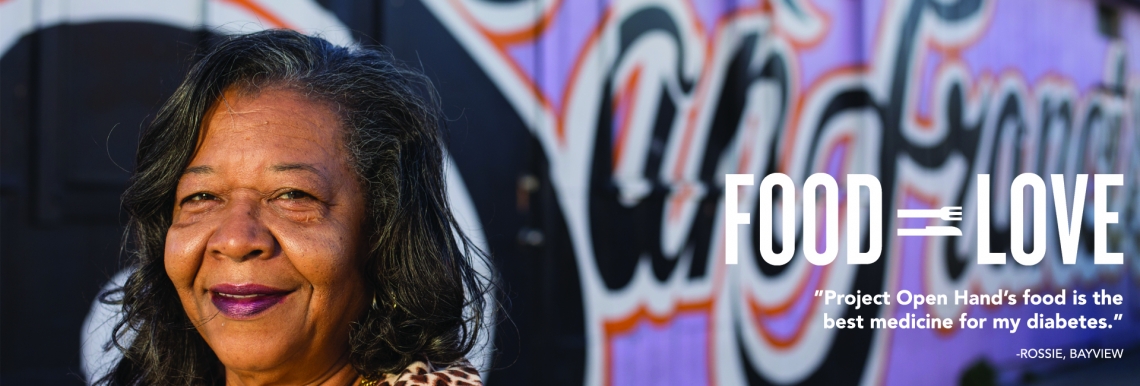
Project Open Hand is proud to announce the completion and publication of a scientific collaboration with physicians and researchers from UC San Francisco that demonstrates with data how the healing power of nutritious food is crucial for serving the critically ill.
The study, published this month in the peer-reviewed Journal of Urban Health, involved more than 50 San Francisco and Alameda County residents living with Diabetes, HIV/AIDS or dual diagnosis. The study showed increases in the number of people with diabetes who achieved optimal blood sugar control and decreases in hospitalizations or emergency department visits. Participants with diabetes also consumed less sugar and lost weight through Project Open Hand’s nutritious and medically tailored meals. HIV-positive clients who received healthy food and snacks for six months from Project Open Hand were more likely to adhere to their medication regiments, and they, along with clients with Type 2 Diabetes, were less depressed and less likely to make trade-offs between food and healthcare, according to researchers at UCSF.
Key Findings
“We saw significant improvements in food security related to all three mechanisms through which we posited food insecurity may affect HIV and diabetes health — nutritional, mental health, and behavioral,” said Kartika Palar, PhD, an assistant professor of medicine at UCSF and co-first author of the study. “For example, we saw dramatic improvements in depression, the distress of having diabetes, diabetes self-management, trading off between food and healthcare, and HIV medication adherence.”
Participants received intensive case management and enhanced nutritional counseling and education from Project Open Hand, while the UCSF research team monitored participants’ physical and mental health, frequency of doctor and emergency room visits, and adherence to therapy.
“This study highlights the vital role that community-based food support organizations can play in supporting health and well-being of chronically ill populations who struggle to afford basic needs,” said Sheri Weiser, M.D., associate professor of medicine at UCSF and senior author of the study.
A summary of the study along with a link to purchase the full PDF can be accessed via this link: http://link.springer.com/article/10.1007/s11524-016-0129-7
Providing healthy food may also be a cost-saving measure for treating individuals living with chronic health conditions: the cost to feed each participant was $6.58 a day, or $1,184 for the six month intervention, significantly less than the estimated $7,349 cost per inpatient day in a San Francisco hospital – the highest average among California cities.
Deep Impact on Client Lives
“For me, the food has done wonders in so many ways. It gave me energy. I was able to decrease my medications,” said diabetic client Rossie from San Francisco’s Bayview neighborhood, who participated in the Food=Medicine program. Rossie’s A1C count decreased from 12% to 8% after receiving the meals.
“Feeding people who are too sick to take care of themselves is at the core of our mission,” said Project Open Hand CEO Mark Ryle. “This study puts Project Open Hand at the forefront of research on healthcare benefits of food and nutrition services. It enhances and advances our mission of feeding people who are too sick to care for themselves.”
Next Steps
Project Open Hand and UCSF are underway with Phase II of the study – “Changing Health through Food Support.” Also known as the CHEFS Project, the research study, funded by Kaiser Community Benefits, will follow 200 existing HIV+ clients in both San Francisco and Alameda Counties as they receive regular specialized nutrition education and access to all of their nutrition needs for six months.
Both the completed Food = Medicine Pilot Study and the CHeFS Project currently underway were made possible thanks to major grant support from the Kaiser Permanente National Community Benefit Fund at the East Bay Community Foundation.
